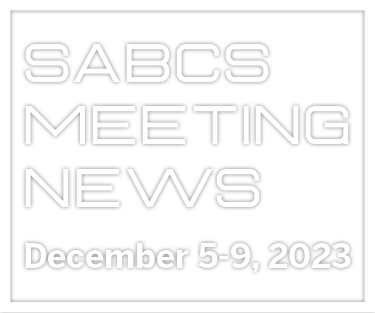The first Plenary Lecture of the 2023 SABCS® will be an exciting talk on the mechanisms of metastasis with a leading researcher whose lab focuses on studying drug resistance and other challenges in the management of metastatic cancer.

Charles Swanton, MB, PhD, FRS, FAACR, FRCP, is Professor and Deputy Clinical Director at The Francis Crick Institute, London. His plenary lecture, Breast Cancer Evolution, Immune Evasion and Metastasis Driven by Chromosomal Instability, will be 11:20–11:50 a.m. CT Thursday, December 7 in Hall 1.
The focus of his lecture will be on elucidating the molecular underpinnings of breast cancer evolution and how chromosomal instability (CIN) impacts immune evasion and metastasis.
Through multi-region sequencing of biopsies from primary triple-negative breast cancers (TNBC) his research reveals the widespread intratumor heterogeneity in somatic mutations and DNA copy number alterations prior to neoadjuvant treatment.
“CIN provides the permissive landscape for selection of copy-number alterations that drive breast cancer proliferation, and consistent with this we observe focal amplifications driven by circular structures containing oncogenes termed extrachromosomal DNA in more than 46% of HER2+ breast cancers,” Dr. Swanton explained.
These extrachromosomal DNA (ecDNA) structures, which accelerate tumor evolution, are particularly abundant in metastatic tumors and contain oncogenes such as ERB-B2 receptor tyrosine kinase 2 (ERBB2) as well as immunomodulatory genes. Additional immune modulation through CIN arises due to loss of heterozygosity in the HLA locus (HLA LOH).
“Finally, we assess the rates of proliferation in individual tumor clones by applying an innovative computational method to single-cell whole-genome DNA sequencing data from more than 42,000 cells from triple-negative breast cancer, enabling reconstruction of their evolutionary dynamics,” Dr. Swanton said. “We demonstrate through orthogonal approaches the critical importance of this approach for mapping the metastatic process.”
Dr. Swanton said TNBC remains one of the most aggressive and challenging subtypes of breast cancer to treat, making this topic particularly relevant. He is a lead researcher in the TRAcking Cancer Evolution through Therapy (Rx) study, known as TRACERx, a nationwide cancer research effort in the United Kingdom, which is expanding its research footprint to breast cancer in collaboration with Unicancer, Institut Gustave Roussy and the Curie Institute.
“Insights from TRACERx Breast are paramount, as they will open up new avenues for understanding the intricate makeup of TNBC tumors, that we hope may ultimately translate into the identification of therapeutic targets,” he said.
SABCS® Co-Director Virginia Kaklamani, MD, is looking forward to the lecture, which will be an illuminating look into the mechanisms of metastasis.
“Discoveries in the lab are slowly finding their ways to clinic, and Dr. Swanton will show us how,” Dr. Kaklamani said.



